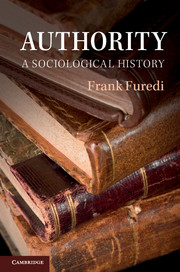Book contents
- Frontmatter
- Contents
- Preface
- Introduction: always in question
- 1 Thersites and the personification of anti-authority
- 2 Socrates and the quest for authority
- 3 Rome and the founding of authority
- 4 Augustus: a role model for authority through the ages
- 5 Medieval authority and the Investiture Contest
- 6 Medieval claim-making and the sociology of tradition
- 7 Reformation and the emergence of the problem of order
- 8 Hobbes and the problem of order
- 9 The rationalisation of authority
- 10 The limits of the authority of the rational
- 11 Taming public opinion and the quest for authority
- 12 Nineteenth-century authority on the defensive
- 13 Authority transformed into sociology's cause
- 14 The rise of negative theories of authority
- 15 By passing authority through the rationalisation of persuasion
- 16 In the shadow of authoritarianism
- Conclusion: final thoughts
- Bibliography
- Index
7 - Reformation and the emergence of the problem of order
Published online by Cambridge University Press: 05 June 2014
- Frontmatter
- Contents
- Preface
- Introduction: always in question
- 1 Thersites and the personification of anti-authority
- 2 Socrates and the quest for authority
- 3 Rome and the founding of authority
- 4 Augustus: a role model for authority through the ages
- 5 Medieval authority and the Investiture Contest
- 6 Medieval claim-making and the sociology of tradition
- 7 Reformation and the emergence of the problem of order
- 8 Hobbes and the problem of order
- 9 The rationalisation of authority
- 10 The limits of the authority of the rational
- 11 Taming public opinion and the quest for authority
- 12 Nineteenth-century authority on the defensive
- 13 Authority transformed into sociology's cause
- 14 The rise of negative theories of authority
- 15 By passing authority through the rationalisation of persuasion
- 16 In the shadow of authoritarianism
- Conclusion: final thoughts
- Bibliography
- Index
Summary
The sixteenth-century Reformation Movement helped to create the conditions for the final unravelling of medieval authority. This movement can be interpreted as at once a cause, a response and expression of the moral crisis of the Roman Church. That Luther's break with the Roman Church coincided with the emergence of soon-to-be nation states ensured that controversies over religious doctrines would intersect with secular political conflicts. The ferocity of theological conflict and its destructive divisive impact had the long-term effect of forcing European society to look for an authoritative solution to the problem of endemic disorder and insecurity. Since violent conflicts of interests were expressed through religious disputes, the search for order was drawn towards secular solutions; and as Hegel remarked, ‘states and communities had arrived at the consciousness of independent moral worth’. As a result authority gradually divested itself of its outward religious appearance and assumed a political form. In the post-Reformation era, authority became increasingly politicised and gradually attached itself to the sovereign nation state.
Unintended shattering of authority
The gradual erosion of the Universalist foundation for medieval authority was the inevitable consequence of the growing salience of national, or at least territorial, consciousness. Until the sixteenth century this consciousness lacked the confidence to express its aspiration through an explicit claim for secular sovereignty. But from the late medieval period onwards, trends towards the weakening of the papacy over temporal matters, the centralisation of territorial institutions, and the crisis of the universal Church were working towards the demise of the medieval idea of authority. The most significant influence at work in the late fifteenth and early sixteenth centuries was the rising criticism of the moral standing of the Church, which ultimately led to the demise of Christian unity and papal authority.
- Type
- Chapter
- Information
- AuthorityA Sociological History, pp. 149 - 180Publisher: Cambridge University PressPrint publication year: 2013



